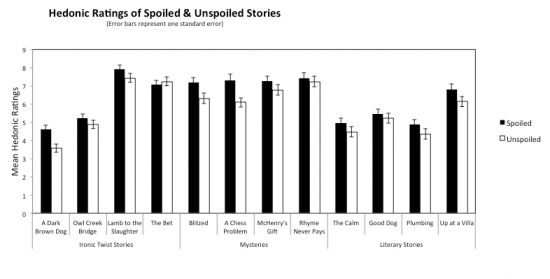Spoilers Are Good For You, Says Study
In the world of film blogging, spoilers are an everyday battle. When you're reading, or writing, about movies that won't be released for months, sometimes years, there's a thin line between feeding your frenzy but also preserving the final experience. The general consensus is that spoilers are bad and most of us do everything we can to avoid them. We believe that if you know who Kaiser Soze is, The Usual Suspects won't be as good. If you know Tyler Durden's identity, Fight Club is ruined. Or if you know Batman fights Bane on the steps of City Hall in The Dark Knight Rises, somehow, that knowledge will take away from your enjoyment of the movie when you finally see it.
Not so, says a new study. In fact, UC San Diego psychology researchers say that spoilers actually make audiences enjoy a story more. Spoilers are good for you. We'll explain after the jump.
io9 were the first to run the findings provided in a UCSD press release. The study will be detailed in an upcoming article from Psychological Science.
Of course, for the sake of our site, just replace "story" with "movie" in most of this.
UC San Diego psychology researchers Nicholas Christenfeld and Jonathan Leavitt wanted to test if being spoiled hurt someone's enjoyment of a story. So they took 30 test subjects and let them read 12 short stories by famous authors like John Updike, Roald Dahl, Anton Chekhov, Agatha Christie and Raymond Carver. Some they just read straight, others they read with a paragraph beforehand that ruined the ending or major twist in the piece. In almost all of those cases, the reader liked the story more when they were spoiled. Here's a graph of people's enjoyments whether they were spoiled, or not, for 12 stories.
As you can see, in all but one case, the subjects liked the stories more when they were spoiled. Why could this be? Here are a few quotes:
Plots are just excuses for great writing. What the plot is is (almost) irrelevant. The pleasure is in the writing.
Once you know how it turns out, it's cognitively easier – you're more comfortable processing the information – and can focus on a deeper understanding of the story.
While this study may, on the surface, seem shocking, I can't say I disagree with it. Just from personal experience, I read the scripts to both Kill Bill and Inglourious Basterds well before seeing the films and even knowing every single beat that was coming, I still loved them. In fact, I might have loved them more because I was excited to see how it turned out. Most people say a book is always better than a movie, but reading those scripts was like reading a great book and then seeing an even better version with the movie.
Another personal example: I avoided any and all spoilers for Star Wars Episodes 1 and 2 but when it came to 3, I dove all in and ate everything up. It didn't hurt my experience because I knew that Anakin killed younglings or Mace Windu died. Like the quote above says, "The pleasure is in the writing." Or, in this case, the pleasure was simply in finally watching the movie. Now is this the same for movies with huge twists? I honestly can't say. Maybe people who've experienced being spoiled on huge films can comment.
To read the full press release with some more info and ruminations on what this means for narrative and suspense on the whole, click here.
What do you think about this? Do you agree? Will this make you embrace all The Dark Knight Rises set photos we post in Superhero Bits?

